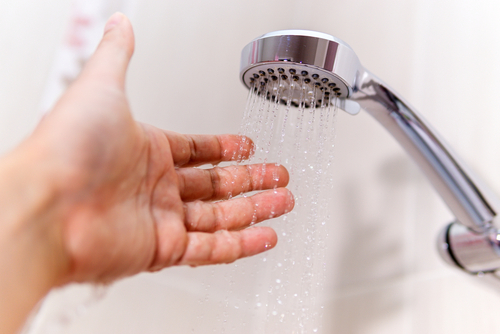Written on: April 24, 2023
 Every household runs better with a steady and reliable supply of hot water. And just about everyone loves a long, hot shower! But the question is: how long can you expect that to last before trouble arrives?
Every household runs better with a steady and reliable supply of hot water. And just about everyone loves a long, hot shower! But the question is: how long can you expect that to last before trouble arrives?
The life span of the most common water heater—units with a storage tank—can vary greatly, anywhere from 7 to 13 years. How long your tank water heater lasts depends on a number of factors, including the temperature of the water you set for the tank, the volume of water used, the overall quality of water heater model, and perhaps most importantly, the water quality. How hard is it? Does it have a high amount of mineral content?
To head off any problems, especially if you have hard water, it’s a wise idea to have a service technician flush out your hot water tank once a year. This procedure will remove sediment that has accumulated at the bottom of the tank. This sediment is caused by the build-up of minerals. The technician can also check the condition of the anode rod, which generally lasts from 3-5 years.
Tank water heaters contain many parts and components, including in most cases a long metal anode rod, which extends the life of your water heater by preventing corrosion from building up inside your tank. This is the unsung “hero” of your water heater.
Usually made of magnesium or aluminum, the anode rod does its job through a process called electrolysis. The metals in the anode rod attract ions that normally would cause rust in iron and steel. But instead, these ions latch on to the anode rod and as a result, cause it to degrade over time. Without the anode rod, your water heater could rust out in just a few years. That’s why it’s so important to replace the anode rod after it degrades.
Note: A water heater only needs an anode rod if it has a tank that’s made of a material that is vulnerable to corrosion. For example, because water heaters made of stainless steel do not corrode over time, these type of models do not need an anode rod.
Next to heating and cooling, heating your water is the next largest use of energy in the home. It accounts for about 20% of your energy bill. The average household uses 65 gallons of hot water a day for showers, dishwashing, laundry and other normal chores.
Heating oil uses less energy than electric for heating water and it’s better for the environment. Electricity generated from a power plant can create more carbon dioxide emissions than heating oil.
With an oil-fired water heater, you’ll not only save money, but you’ll also reduce your carbon footprint. An oil-fired water heater heats water much faster and for less money when compared to an electric water heater.
Westmore Fuel installs two types of oil-powered water heaters
This is the most common type of water heater, with a dedicated burner inside to heat water that is stored in a tank. As you use the water in the tank, the supply of hot water is constantly replenished.
Indirect-fired water heaters use the burner inside your boiler to heat your tap water. (The boiler water never mixes with the contents of your water heater). Because of this configuration, an indirect-fired water heater is one of the most efficient water heating options available.
Benefits of this type of unit include:
If you think your water heater is failing. please reach out to us about a water heater replacement or if you have questions about water heater maintenance.
Westmore Fuel is your best choice for hot water heater installation in CT and NY. We have decades of experience in evaluating our customers’ hot water needs. We will be happy to review your usage and provide a free estimate for the cost of a new hot water heater, along with the expected savings you will experience with your new unit. Please contact us today.